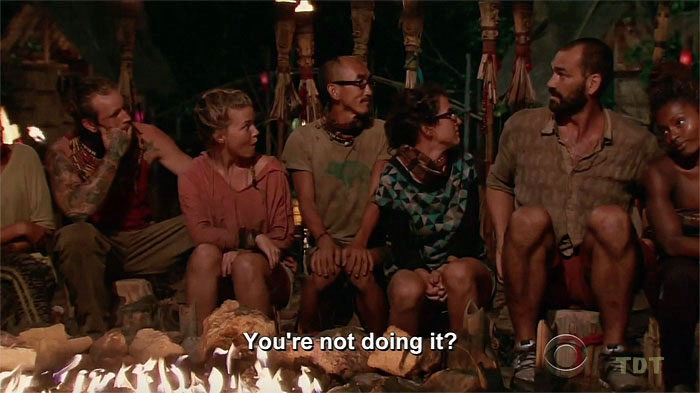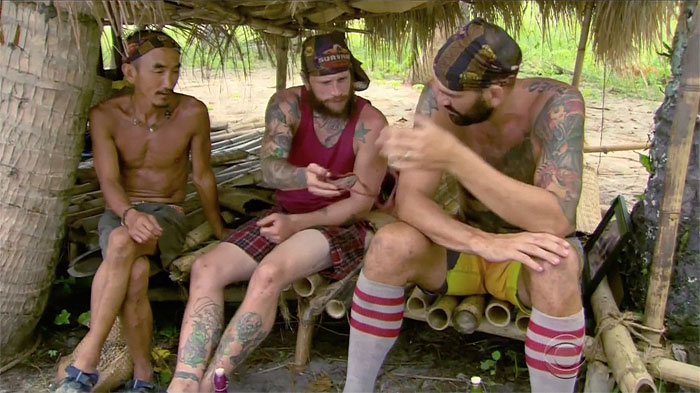

For most of us, when we think about ethics, we think about right and wrong. Ethics tells us what we should do and what we shouldn’t do.
But ethics are a lot more complicated than that, of course. Back when I was in college, I took way too many classes that revolved around ethics. You see, my college is somewhat famous for its over-the-top program in Development of Western Civilization, which forces, yes forces, students to take seemingly a gazillion courses that feature long discussions about different types of ethical theories.
And that’s all I kept thinking about while watching Tai make the decision at the center of this week’s episode of Kaoh Rong: What ethical theory is Tai subscribing to?

I don’t think Tai made a simple – or correct – decision. You see, while I know Scot and Kyle/Jason told Julia they didn’t want to bring Tai to the end with them, first, I’m not sure that’s true and, second, that certainly doesn’t mean Tai still wouldn’t have made it to the end. Look, I think Tai just went from the bottom of a group of three to the bottom of a group of five … or six. That doesn’t seem like a good move to me.
But let’s get back to the ethics thing for a second. There are two competing ethical theories at play here. Basically, different theorists argue there are differing ways you should approach making ethical decisions. In the case of last episode, I would argue Tai subscribed to virtue ethics, which basically argues that to live an ethical life, you must act with character above all else and avoid things like greed. To us, it seemed like Tai struggled with being with the guys because they were doing things he perceived to be unethical.
At one point during the episode, Tai even said that he thought he’d have a better chance of winning against the guys. But here, Tai made a decision he found more ethical, one that didn’t take into account greed or selfishness.

Many people, though, argue Survivor isn’t a show about ethics. It’s about winning and anything legal you do within the context of the game is cool. If any of you have heard Richard Hatch discuss these things, especially at RHAP, you know he’s a big proponent of this approach. And there’s an ethical belief system about this too. It’s called consequentialism, and the theoretical foundations of this belief basically argue that the consequences of an action are how one should judge a behavior’s rightness or wrongness.
In the case of Tai, a consequentialist would argue he’s not breaking rules and if aligning with Scot and Kyle/Jason results in the best chance of winning, then it’s right thing to do.
More than any time recently, really, we saw a contestant on Survivor really struggle with the ethics of a decision. Based on how most of us probably responded to Tai’s refusal to give Scot the idol, we probably believe Tai did the right thing. But did he do the right thing for his game? And is the right thing for his game the overall right thing considering the point of a game is to win?
These are the ethical questions castaways always deal with and, at least to me, it was pretty cool to see Tai deal with this struggle explicitly last week. We’ll have to wait and see how the ramifications of this example of virtue ethics manifest themselves in Tai’s game. But that’s for next week.
Now is the time we talk about the folks remaining the game:
Dara Tribe

- 1. Joe —If there’s one clear knock on this season besides the bullying, it’s that Joe is still in this game. I get the arguments that a season is always better when there are different types of players still in the game. I mean, we don’t only want strategists, for example. But I’m coming to the idea that Joe is just a waste of a spot. The man seemingly has no interest in winning or, even, playing the game. What’s the point?
- 2. Kyle/Jason – This next week is going to be a good indicator of the kind of person Kyle/Jason truly is; are we dealing with just editing as Scot explicitly said in exit interviews? Kyle/Jason once again found himself on the wrong end of a plan and the numbers. He’s seemingly not long for this game at this point, but does he take it like a good sport or revert to bullying and whining? We shall see.
- 3. Aubry – The Aubry Winner’s Edit™ theory should now have quite a bit more momentum. Her performance at that immunity challenge and the way she’s narrating the game for us makes it clear, to me at least, that Aubry is probably going to be at final Tribal. And, I have to say, I’m warming up to her as a player. At first, I thought she was a little too wishy-washy for my taste, but her speech to Tai this week … well, man, it was perfect. If someone ever makes a video of how to play Survivor, that speech needs inclusion.
- 4. Tai – I discussed Tai above, arnd I stand by opinion that I do not think he made a good move this week. I’m foreseeing a sixth place finish for the dude who was, at one point, one of my favorite castaways ever. I’m thinking Kyle/Jason gets the boot this coming episode and then the women and Joe (or, come on, just the women) con Tai into thinking he’s safe when he definitely isn’t.
- 5. Cydney – Nobody perplexes me more than Cydney. And I blame the producers for this. Or maybe Cydney just doesn’t provide good confessionals. I mean, for some reason, it seems like Cydney is an integral part of what keeps happening in the game, but we rarely hear her perspective on any of this. When she does talk, it’s usually to say something bad about her former tribemates at Brawn Beach. Why does only Aubry get to narrate the action?
- 6. Michele – Once again we end an episode with very little Michele. What’s her game? Where is her loyalty? We got a glimpse this week with Michele and Julia seemingly not told the actual plan of booting Scot, but it’s still not clear where Michele sees her game going. For a bit of time during the early episodes, it looked like Michele was going to be a real player, but I’m starting to truly doubt that.
- 7. Julia – Oh Julia, you were like my 1,234th winner pick of this season. I might need a new one. I still can see a viable path Julia can take to the end and make a very good argument for winning, but that path seems more and more blocked by trees, debris and the walking dead. This episode, with seven left, will prove pivotal for Julia, I think. If she wants to make a move to set herself up for the end, this is the time.
OK, so that’s all I’ve got for this week. Let’s meet back here next week to talk about what goes down at final seven, which is usually means a very good episode. Until then, though, let’s do some chatting in the comments.
 Pat Ferrucci started watching Survivor when episode two of Borneo first aired. He’s seen every episode since. Besides recapping here, he’ll be live-tweeting this season from the Mountain Time Zone. Why? Because nobody cares about the Mountain Time Zone except when they want to ski. Follow him @patferrucci for Survivor stuff and tweets about anything and everything that enters his feeble mind.
Pat Ferrucci started watching Survivor when episode two of Borneo first aired. He’s seen every episode since. Besides recapping here, he’ll be live-tweeting this season from the Mountain Time Zone. Why? Because nobody cares about the Mountain Time Zone except when they want to ski. Follow him @patferrucci for Survivor stuff and tweets about anything and everything that enters his feeble mind.
- Index of articles
- Pre-season cast preview
- Ep.1: Producers prime those identities right away
- Ep.2: Jenny shows everyone how not to play Survivor
- Ep.3: How self-perception took down the Brains
- Ep.4: Brawn depletes its ability to keep Alecia around
- Ep.5: An exchange Anna hopes to forget
- Ep.6: Ironically, Peter is not so attractive?
- Ep.7: Emerging power
- Ep.8: A story Nick didn't quite understand
- Ep.9: Lack of regulation dooms Debbie
- Ep.10: Tai doesn't let ethics tie him down
- Ep.11: Michele follows along to someone else's agenda
- Ep.12: Tai's a metaphor for a bad player
- Ep.13: A winner's edit?
- Pre-Ep.14: Jury Jeopardy
- Ep.14: So this is how it ends...